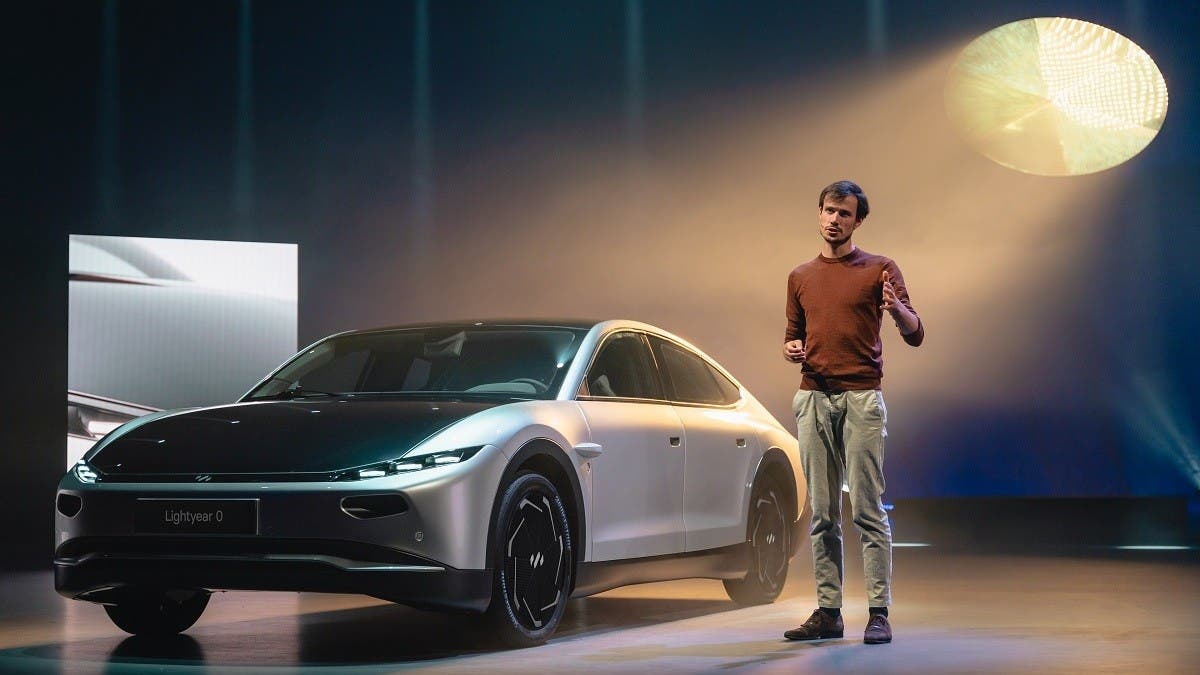Lightyear, the Dutch startup that launched the world’s first long-range production-ready solar electric vehicle three weeks ago, will be opening testing facilities and a sales office at the Sharjah Research, Technology and Innovation Park (SRTI Park), the first such facility outside the Netherlands.
A Memorandum of Understanding was signed by the two sides to create Lightyear’s first international presence outside of the Netherlands, reflecting the growing international importance of Sharjah in enabling development of sustainable mobility solutions through the SRTI Park.
For the latest headlines, follow our Google News channel online or via the app.
The two parties will collaborate on a range of activities, including setting up testing facilities and sales and service partnerships across the region.
In addition, Lightyear and SRTI Park will boost university research exchange programs on solar-powered EVs, and work on policy initiatives to support governments in creating incentives for electric vehicles, including solar-extended EVs.
Established in 2016, SRTI Park aims to develop and manage an innovation ecosystem that promotes Research and Development and supports enterprise activities and enable the collaboration of industry, government, and academia.
In SRTI Park’s role as a key technology incubator, the partnership will also enable fundraising for development and production of future Lightyear models and could pave the way for local manufacturing in Sharjah in the future, utilizing advanced research of leading Sharjah universities.
Lightyear is considered one of the most exciting and innovative companies in the EV industry. On May 30, it launched Lightyear Zero, a revolutionary car that can be charged by the sun as well as regular household plugs. Charging on-the-go, it gains up to 70 km of range per day from the sun alone.
Production is expected in the fall, with the first batch of cars to be delivered to customers in Europe in November. Test drives are set to begin imminently.
The MoU was signed by Hussain Al Mahmoudi, CEO of SRTI Park, and Lex Hoefsloot, CEO of Lightyear, on June 13 in the Netherlands, in the presence of Mariam bint Mohammed Almheiri, UAE Minister of Climate Change and Environment, Jamal Al Musharakh, UAE Ambassador to the Netherlands, and Lody Embrechts, Ambassador of the Netherlands to the UAE, with facilitation by consultancy firm Sawadi Ventures.
Speaking on the new partnership, Almheiri said: “The UAE has created a holistic innovation ecosystem that helps companies develop and scale up trailblazing solutions. Today, it is a hub for top-notch competencies and scientific innovations, particularly those related to clean energy. This complements our nation’s efforts to combat global warming and contribute to collective climate action, and aligns with the UAE Net Zero by 2050 Strategic Initiative. We are pleased by Lightyear’s decision to set up its first base outside the Netherlands at SRTI Park, and wish the company success in its endeavors.”
SRTI Park CEO Al Mahmoudi said: “This is an exciting moment for SRTI Park, which was set up to turn Sharjah into a hub for cutting-edge innovation, R&D, higher education, and university-level research. We are delighted to add Lightyear to our list of global innovators. Lightyear figures in the same league as Tesla, Rivian, and LUCID as one of the innovation pioneers in the EV industry.”
“Having Lightyear at the SRTI Park boosts the UAE’s position as a nation on the frontline of the transition to sustainable mobility, and in doing so, contributes to combating climate change through innovative technologies. UAE is already the world’s third largest producer of solar power, making it the perfect place to test and prove Lightyear’s solar extender solutions for EVs. We are confident that Lightyear’s presence at SRTI Park will spark interest among all countries in the region to embrace EVs,” Al Mahmoudi added.
Lex Hoefsloot, CEO and Co-Founder of Lightyear, said: “We look forward to collaborate with SRTIP to push further innovation into solar electric vehicles. The GCC region is of strategic importance for our company.”
Innovation-driven companies at SRTI Park
SRTI Park has been attracting global innovation-driven companies that are conducting R&D in vital sectors such as transportation, vertical farming, hydrogen energy, 3D printing, etc.
Lightyear, which began as a car racing team, became experts in energy efficiency and decided to put their knowledge to good use by going into solar car technology. Six years later, the revolutionary Lightyear Zero is under production and is set to upset the EV industry. The car requires only 1,500 kWh per year, thus making it twice more efficient than the Tesla model S, the equivalent in its category. For the average commuter, Lightyear estimates that the car requires up to five times less charging.
Lightyear’s entry into the EV market comes at a time when it is estimated the total EV transition for Europe would cost over $84.4 billion (80 billion euros), of which over $52.7 billion (50 billion euros) are estimated to be used for the charging infrastructure. With Lightyear’s innovations, dependence on charging infrastructure would be mitigated, thus accelerating EV transition at drastically lower costs.
Read more:
Rivian’s Saudi backer Abdul Latif Jameel to invest in Indian two-wheeled EVs
Construction has begun on Lucid EV factory in Saudi Arabia: Investment minister
SABIC launches program to develop EV technology


 World3 years ago
World3 years ago
 World3 years ago
World3 years ago
 Business1 year ago
Business1 year ago
 Entertainment7 years ago
Entertainment7 years ago
 World7 years ago
World7 years ago
 Entertainment7 years ago
Entertainment7 years ago




